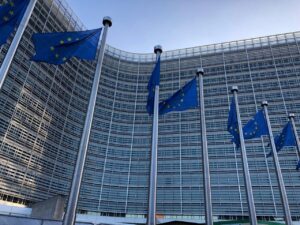After the failure to subject the controversial Nord Stream 2 project to the Third Energy Package and to acquire the mandate to negotiate a legal regime with Russia, the European Commission wants to update the offshore pipelines regulations to finally apply the EU law to the project – writes Wojciech Jakóbik, BiznesAlert.pl’s editor in chief.
Filling the legal gap
In a conversation with Members of the European Parliament, the Director of the Internal Energy Market at DG Energy Klaus Dieter Borchardt said that the EC would like to apply the planned regulations to the Nord Stream 2 pipeline. The project is pursued by Russia’s Gazprom (which owns 100 percent of the project consortium’s shares) and is bankrolled by five European companies: Uniper, Wintershall, Engie, Shell and OMV.
The Commission will present the draft regulation in mid November. It will include a new definition of an interconnector, about which BiznesAlert.pl reported previously. The law will be extended to offshore gas pipelines that enter the EU territory from third countries, just like Nord Stream 2. The existing regulations cannot be applied to these kinds of pipelines. This is why the EC warned that if appropriate action is not taken, the Russian pipeline could be constructed in a „legal void”.
New dispute between Member States on the horizon
The MEPs allegedly supported a speedy legislative track for the amendments. The Member States are to discuss the proposal on 12 October. If the works on the new definition of an interconnector are hindered, it will happen at the European Council. Germans support the project and may, for instance, delay the adoption of the new law until Nord Stream 2 is completed. Analysts who back the new pipeline have already hailed the EC project as „Lex Nord Stream 2” and are arguing that this is an attempt at drafting regulations on political orders. They also claim that Nord Stream 2 is just a business endeavor, which is not true. It does have a political impact which is similar to Brexit, about which we have written multiple times at BiznesAlert.pl. Despite that, the prospect that the EU law will apply to the project may be perceived as an additional risk to the investment. „If the Third Package is applied, the project will die,” an anonymous source told the Polish Press Agency in Brussels. This is caused by the fact that the ownership unbundling rule, which is part and parcel of the EU antitrust law, says that one company cannot at the same time operate a gas pipeline and use it to transmit gas. Whereas Gazprom has a monopoly on exporting gas from Russia. This means allowing competition to use Nord Stream 2 would force changes in Russian law for which the Kremlin is not necessarily ready, as it would weaken the company, which is an effective foreign policy tool.








